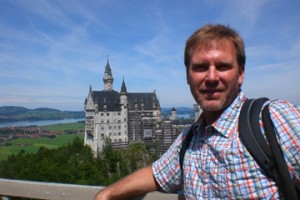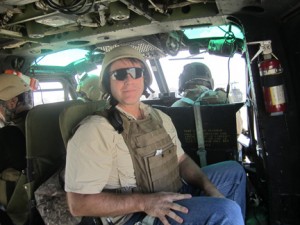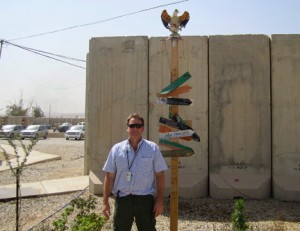By Kate Helm
In midst of an intense spring and early summer with the Queen’s Diamond Jubilee and preparations for the Summer Olympics, Keith Hanigan ’85, facility manager for the U.S. Mission to the United Kingdom, representing the Embassy in London, has also been playing a key role in planning for the new U.S. Embassy set to break ground next year in the Nine Elms area of Wandsworth.
As senior technical adviser, Hanigan works with Overseas Building Operations and project architect KieranTimberlake to “represent the post’s interests, provide design input, review submissions at various design stages, and help the embassy prepare for the transition in 2017.”
Of the controversies that have arisen regarding the project, Hanigan says that all parties involved are “doing an excellent job of trying to engage the local populace, provide information on a consistent basis, and be cognizant and respectful of local culture and sentiment.” He also noted that the new embassy, as all present and proposed developments in the Nine Elms area, must be an energy provider, producing a surplus of energy—generally heat—to the city grid.

While stationed in Austria, Keith Hanigan '85 visited Neuschwanstein Castle, Bavaria, Germany.
Hanigan, who also represents the U.S. Consulates in Belfast, Northern Ireland and Edinburgh, Scotland, has been a foreign service officer for the past 20 years, working in seven other locations—the Solomon Islands, El Salvador, Guatemala, Nicaragua, Brazil, Austria, and Iraq. He also carried out temporary assignments in Australia, Papua New Guinea, Cambodia, China, Ireland, Germany, Slovakia, Portugal, and Turkey.
It all started when he gave up security for adventure, leaving a well-paid position with Turner Construction Company in Boston, Mass., for a two-year assignment with the Peace Corps in the Solomon Islands in 1988.
“I learned more than I imparted and received far more than I could ever have given,” says Hanigan, a civil engineering graduate. “As vastly different as the Solomons were from my upbringing in New Jersey, humans have the same basic needs the world over, and I found myself more intrigued by the similarities than the differences. Joining the Peace Corps undoubtedly had the single greatest impact on my career, worldview, and life.”

Keith Hanigan '85 sits in a Huey helicopter, the principal transportation in Iraq.
His dedication was rewarded last year when the State Department presented him with the prestigious David E. Foy Memorial Award for Excellence in Facility Management for his work as senior facility manager to Embassy Baghdad from 2010-11. The citation recognizes him for “exceptional performance, leadership, energy, adaptability, and interpersonal skills in one of the most demanding positions at the Department’s largest and most complex Embassy.”
At Lafayette, Hanigan enjoyed English and history the most. He remembers Edward Wetzel ’74, former faculty member and now executive vice president of water and waste resources for SAIC, Framingham, Mass., as a demanding but incredibly enthusiastic professor who was very involved in the community. He tries to emulate that passion in his own work.
“The undergraduate environment at Lafayette allowed me to pursue my varied interests,” he says. “I left school with the feeling that anything was possible, and that gave me the confidence to try new things and take chances when opportunities arose. I have tried to build my career around people and public service, and I absolutely have no regrets. As cliché as it may sound, I truly enjoy public service.”

Keith Hanigan '85 stands at a military base in Mosul, Iraq.
The year in Iraq was by far “the most challenging and rewarding experience of my professional career,” says Hanigan, who acknowledges a group effort. His team faced many challenges including extreme summer temperatures, sandstorms, winter flash floods, the constant threat of rocket and mortar attacks, and the volume and diversity of facilities-related issues spread out over a dozen sites.


